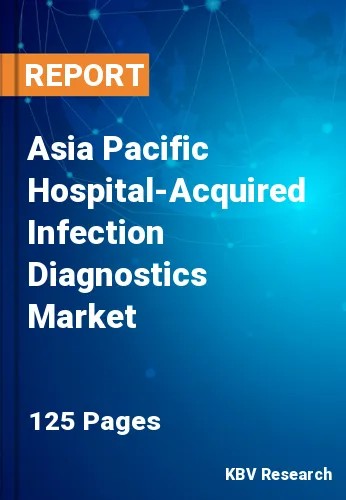The Asia Pacific Hospital-Acquired Infection Diagnostics Market would witness market growth of 8.5% CAGR during the forecast period (2022-2028).
Obtaining detailed information about the patient's medical history and completing a comprehensive physical examination is critical in evaluating whether the infection occurred before admission or was acquired in the hospital. Important details from the past, such as subjective temperature, chills, and night sweats, could imply that the infection was not caught in the hospital. Fever, altered mental status, chills, shortness of breath, productive cough, palpitations, abdominal discomfort, flank pain, polyuria, dysuria, suprapubic pain, and diarrhea are all common infection symptoms. Vital signs can reveal symptoms of sepsis or a systemic inflammatory reaction. Hypothermia or hyperthermia, tachycardia, tachypnea, and hypotension are examples. Tracheostomies, foley catheters, endotracheal tubes, intravascular lines, insulin pumps, and pacemakers/defibrillators must all be thoroughly examined. The information about the device's position and placement complement the evaluation of external devices (setting and duration).
Asia Pacific region is one of the regions that has been recording the patients that acquired the infections from the hospital itself and eventually get permanently disabled or sometimes die. Hospital-acquired infections (HAIs) pose a significant threat to patient safety and have significant public health implications, as it affect patients' quality of life and can sometimes result in death or permanent disability. The full cost of HAI, particularly in developing nations, is unknown.
As the government battles a recurrence of locally transmitted cases, China has stepped up measures to avoid infections in hospitals. For instance, according to a directive established by the State Council interagency working force for COVID-19 response, hospitals authorized for treating complicated cases should take aggressive measures to contain infections. All hospital-acquired infection cases, both locally and imported contracted, along with asymptomatic carriers, were admitted to recognized hospitals' isolation wards and kept segregated from patients with other kinds of diseases.
The China market dominated the Asia Pacific Hospital-Acquired Infection Diagnostics Market by Country in 2021, and would continue to be a dominant market till 2028; thereby, achieving a market value of $463.6 million by 2028. The Japan market is poised to grow at a CAGR of 7.9% during (2022 - 2028). Additionally, The India market would display a CAGR of 9.2% during (2022 - 2028).
Based on Product, the market is segmented into Reagents & Consumables and Instrument. Based on Infection Type, the market is segmented into Urinary Tract Infections (UTI), Hospital Acquired Pneumonia, Bloodstream Infections, Surgical Site Infections, Gastrointestinal Infections, and Others. Based on Application, the market is segmented into Drug-Resistance Testing and Disease Testing. Based on Test Type, the market is segmented into Molecular Diagnostics, Immunoassay, and Urinalysis. Based on End User, the market is segmented into Hospital, Standalone Laboratories, and Others. Based on countries, the market is segmented into China, Japan, India, South Korea, Singapore, Malaysia, and Rest of Asia Pacific.
Free Valuable Insights: The Worldwide Hospital-Acquired Infection Diagnostics Market is Projected to reach USD 5.6 Billion by 2028, at a CAGR of 7.8%
The market research report covers the analysis of key stake holders of the market. Key companies profiled in the report include Bayer AG (Bayer Schering Pharma AG), Danaher Corporation, Becton, Dickinson and Company, Hologic, Inc., Ecolab, Inc., Pfizer, Inc., Steris PLC, Johnson & Johnson, Abbott Laboratories, and Merck Group.
By Product
By Infection Type
By Application
By Test Type
By End User
By Country
Our team of dedicated experts can provide you with attractive expansion opportunities for your business.

